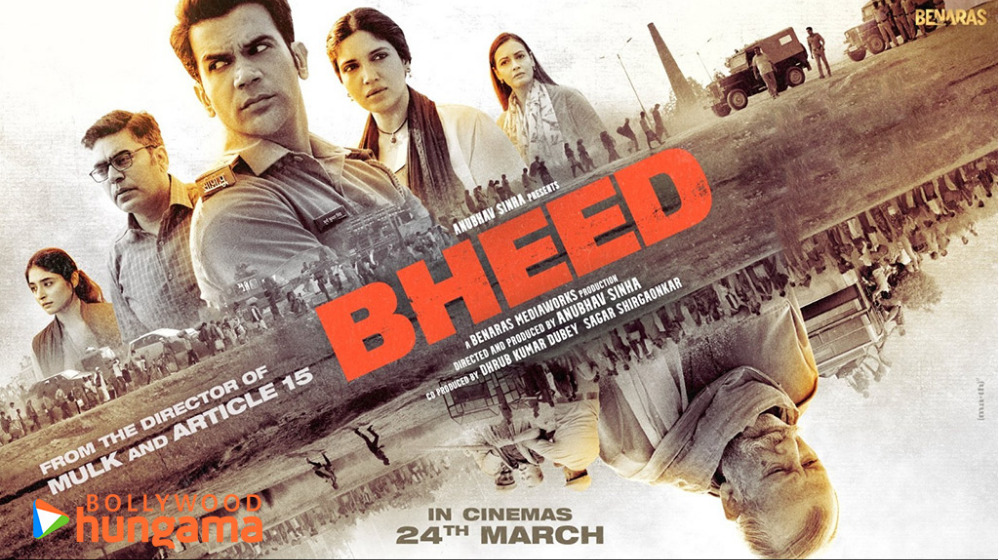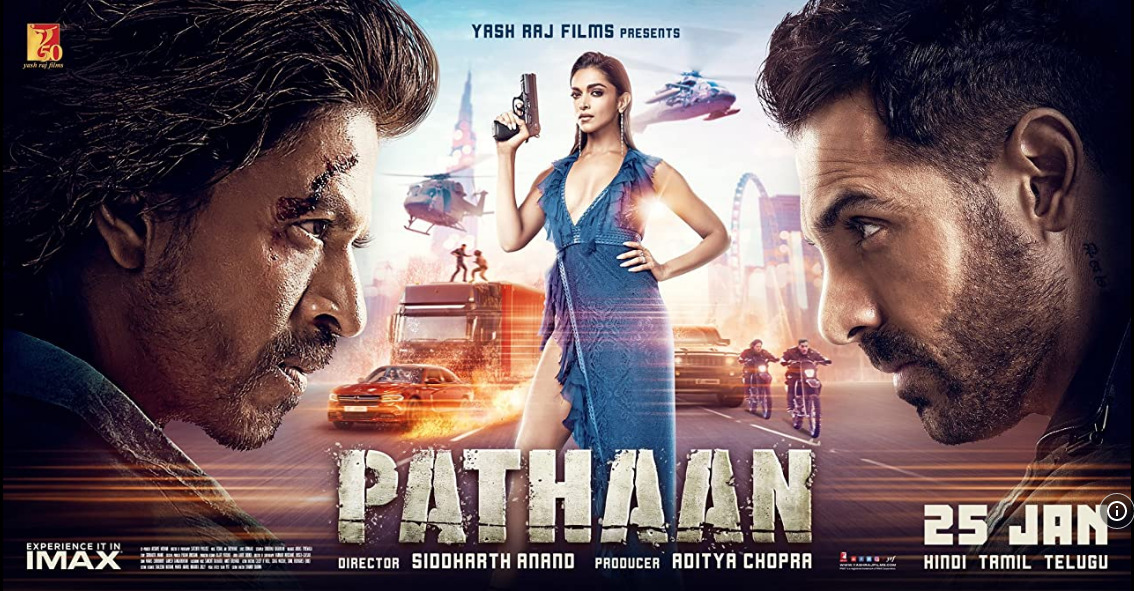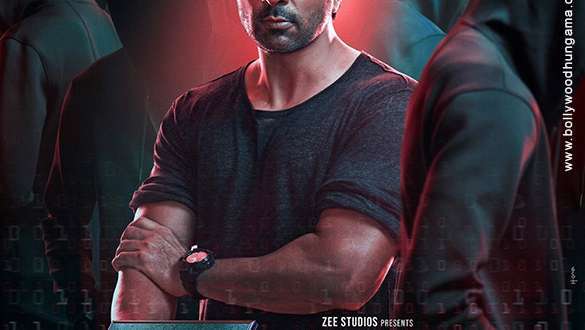
Bheed (2023): Starring Rajkumar Rao as police inspector Surya Kumar Singh
The socio-political drama unfolds. It was March 24, 2020. The honorable Indian Prime Minister Narendra Modi, a.k.a “PM Modi”, made an abrupt announcement at around 8 PM that the entire country will undergo a complete lockdown for 21 days effective from midnight. This announcement was made so suddenly that the entire country went into chaos! This meant that the entire country had only four hours till it went under a complete lockdown. People watching television rushed out to retail stores to pack their shelves with food and supplies which could last them for the next 21 days. The poor migrant laborers who were staying apart from their families had to return to their homes, and they had no other option other than accommodating themselves into trucks and trains or walking all the way to their homes carrying heavy backpacks! And what would you expect to come their way? The Great Indian Police Force of course, who were set by the Indian government to beat up and brutalize any person who would violate the Lockdown.
This is the true story of the oppressed and poverty-stricken laborers in India during the first COVID-19 Lockdown. Starring Rajkumar Rao as police inspector Surya Kumar Singh, Bheed has been co-written, produced, and directed by Anubhav Sinha.
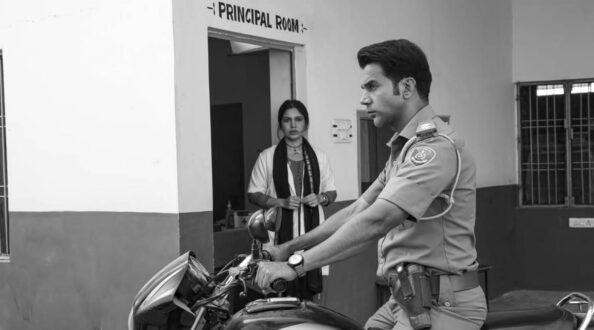
Rajkumar Rao and Bhumi Pednekar in a scene from Bheed
Bheed (2023): The Announcement
So here, let me first explain the basis on which PM Modi took this abrupt decision. In his televised address to the nation, PM Modi said that the coronavirus pandemic in India can only be contained by “social distancing”. Therefore, in his opinion, if people remained locked in their houses for a period of 21 days, the coronavirus infection chain will be broken! He had consulted health sector experts before arriving at this decision. Also, before the complete lockdown began, he had requested all obedient Indian citizens to clang plates and other utensils on their balconies for five minutes as a mark of solidarity and appreciation for the front-line workers who were dealing with the COVID-19 virus. “THAALI BAJAO”!!
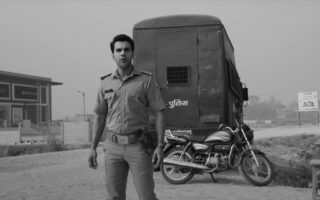
Rajkumar Rao in a still from Bheed
Leaving all this behind, let’s get back to the poor Indian laborers who were struggling to return home in the suddenly imposed lockdown. When such an abrupt decision was announced at 8 PM on March 24, 2020, that within four hours the entire country will shut down and no human being will be allowed to step out of their homes, how on earth do you expect that the poor laborers who had no transportation means could have made it to their respective homes which were hundreds of kilometers away? Those poor migrant laborers somehow managed to get on trucks, busses, or trains, wherever they could find some place to accommodate themselves and started their journey towards their homes amidst the Lockdown. Some of them had no other option other than to walk to reach their homes, which were hundreds of kilometers away.
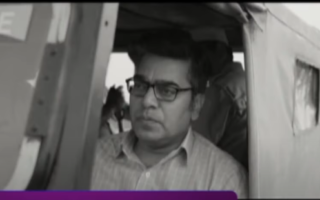
Ashustosh Rana as police head in Bheed
But the journey of these migrant laborers came with severe hurdles in the form of the Indian Police Force. When these laborers were caught on the streets, they were assumed by the police to be violating the lockdown terms, where in fact they were only journeying to return to their homes. If PM Modi had some sympathy and conscientiousness for these laborers, being a responsible Prime Minister of a country like India, he should have at least made some transportation arrangements for them so that they could have reached their homes safely. But the fact is; India is only meant for super-rich people! Here the poor and oppressed classes don’t stand a chance. So, did these migrant laborers. Many of them became victims of police brutality on the streets where they were beaten up badly with their accusation being that they had violated the Lockdown terms. Many of these laborers weren’t able to reach their homes. Hundreds of them died in their journey, several due to police beatings and many others due to unexpected accidents.
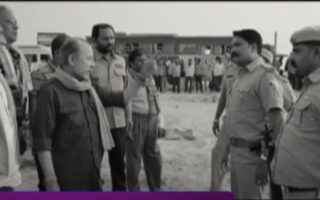
Pankaj Kapur in a confrontation scene with the cops in Bheed
Bheed narrates the story of a large group of Indian migrant laborers who, during their journey to their homes in the COVID-19 Lockdown, hit a police checkpoint that won’t let them travel any further. Chaos, fear, and violence erupted at the checkpoint which led to a situation even more deadly than the coronavirus pandemic.
You may come across several online platforms which claim that this story is fictional because they have been made to say so. The truth is that this story is as real as you, me, and the Indian government itself!
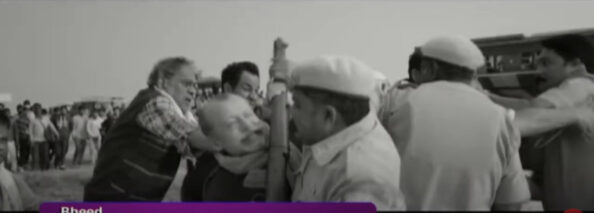
Pankaj Kapur and his group vs the cops in Bheed
Bheed (2023) Original Trailer (Now Deleted):
Bheed (2023) Official Trailer (Modified):
The Good:
Impactful Screenplay
Bheed has an engaging screenplay along with a realistic plot. The screenplay doesn’t engage in melodrama but straightway showcases the actual incidents which occurred. However, the screenplay in Bheed is not just about showing the Indian government’s apathy toward the misery of the impoverished. This movie mainly focuses on the social rift amidst the tragedy. Talking of racism; it is high in India! That’s what this movie centers around.
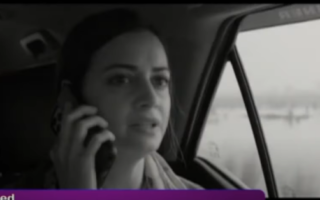
Dia Mirza in a scene from Bheed
Scenes in Bheed depicting chaos and violence will impact your mind. A scene depicting a young girl carrying her old father on a bicycle amidst the lockdown chaos will certainly raise emotions. The screen time of the events shown in Bheed has been kept concise within its almost two-hour run duration. Atanu Mukherjee’s precise editing does combine aptly with Anubhav Sinha’s immaculate direction.
Some of the scenes in Bheed were gruesome indeed. A group of laborers resorted to walking on the railway tracks and following the tracks to reach their homes. A train came all of a sudden and crushed the entire group. Incidents like this really happened during the Lockdown.
Rajkumar Rao: A Cop With A Moral Sense Of Duty!
After watching Bheed, my respect for Rajkumar Rao has genuinely increased. Earlier I just considered him to be a wannabe actor who would play cheeky roles. Although he had given some engrossing horror movies in the past like “Stree”, his overall acting career was not so impactful. But his dynamic character as the heroic cop in Bheed, who is bundled with morality and empathy towards the impoverished, is worth the applause. Through his character of police inspector Surya Kumar Singh, who was in charge of the checkpost where the laborers got stranded, Rajkumar Rao has portrayed what every modern-day cop needs to be. To protect the weak and fight for the rights of the weak is the moral duty of a cop, and not to terrorize innocent people upon receiving government orders.
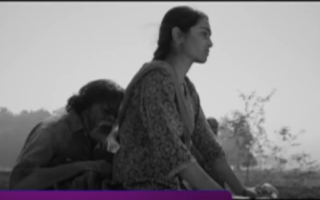
A girl carries her father on a bicycle amidst the chaos
Bhumi Pednekar, as a medical student and Surya Kumar Singh’s love interest, lent great support. Of course, this is a Bollywood movie and there cannot be a Bollywood movie without the depiction of love, no matter how harsh the situation may be. Surya was inferior to his girlfriend in terms of caste, so you have to watch this movie to know if her upper-caste parents will accept the lower-caste cop as their son-in-law. Moreover, Rajkumar Rao also narrated a dialogue to Bhumi Pednekar which goes, ”Hum Aapke Ghar Aayenge, Lekin Chappal Pehenkar”, which means, “I will come to your house but with my slippers on my feet”. In India, the age-old custom was that lower-caste groups had to walk across the villages of upper-caste people with their slippers on their heads. Through this statement, Surya took a dig at this age-old custom in India and wanted to convey to his beloved who was of the superior caste that, he will stand at par with her caste and will walk up to her home not with his slippers on his head, but on his feet.
Great Support
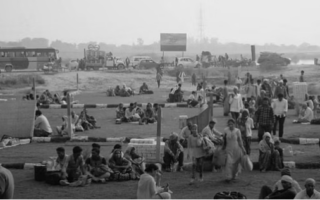
A still from Bheed
Supporting actors Ashutosh Rana and Pankaj Kapur made their presence felt throughout the movie. Dia Mirza in her character of a rich woman in Bheed commented on the laborers, “Inki Immunity Bahut High Hoti Hai”, meaning “These laborers have high immunity, (so the virus won’t affect them)”. Does she mean that just because they are hardworking laborers who toil under the sun day and night, they have gained immunity to the coronavirus?” This comment of hers was direly racist, insensitive, absurd, and illogical. But what her driver did next was impactful enough to evoke emotions in the viewer’s mind. He helped the girl who was carrying her old father in a cycle ignoring his mistress screaming at him to come back. After helping the father and daughter, he came back and told his mistress, “Madam, I came back not to secure my job but to help you and drive you to your destination. In this situation if we don’t help each other, then who will?” Throughout the movie, you will come across many poignant dialogues by aggrieved characters.
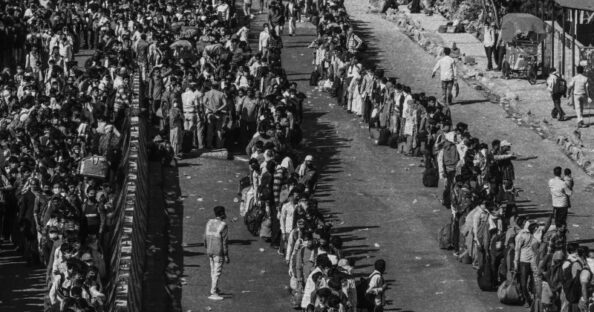
Another still from Bheed
The Bad:
Dull Cinematography In Black And White
A negative aspect of Bheed is that this entire movie has been shot in black and white. Yes, you read that right! This is a completely black-and-white film. For cinematography critics, this can be disappointing. Actually, the film has been shot in black and white to depict the colorless pattern of human misery amidst the exodus. However, this was not really necessary if you ask me. Cinematographer Soumik Mukherjee could have kept the frames colored as the story itself is impactful enough to portray misery. In fact, the colorless background gave a somewhat dull viewing experience.

The Verdict:
I salute Anubhav Sinha for coming up with an eye-opener for Indian citizens. Till today my blood boils thinking about the poor migrant laborers who died. Did they really deserve this? Is being poor or oppressed a crime in India? India is truly a biased nation, I have to say. Here in school when I was a kid, those children who belonged to rich and influential parents were treated with respect while those kids who belonged to “not-so well-to-do” parents were treated harshly.
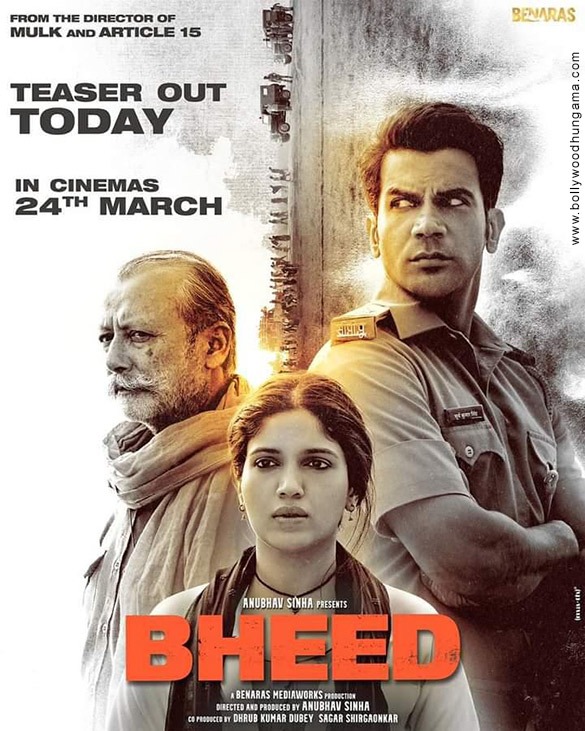
The astonishing part about Bheed is that this movie was hugely modified before its release. Many of you may not be aware of this fact. What Anubhav Sinha tried to convey through this movie has been hugely suppressed. If you see Bheed now, you will only be shown the lockdown chaos, caste oppression, and to some extent the brutality faced by the migrant laborers. But the original movie was edited to the extent the horror movie “The Exorcist” was, just to cover up the Indian government’s negligence and bad decision-making.
The Indian Censor Board removed the lockdown-imposing address of PM Modi in the edited version. In fact, PM Modi and his voice were completely omitted from the edited version in order to avoid any sort of controversy against him. The scenes in Bheed which depicted excessive police brutality and graphic violence on the laborers were edited and moderated as well. I want to applaud the Indian Censor Board for this! When you approve of the gruesome, gory, and hideous scenes of “The Kashmir Files”, what made you omit these sensitive scenes which were much less intense than those in “The Kashmir Files”? I believe The Censor Board will have no answer to this. But I have! This may have been done so as to not expose the misdeeds of the Indian government which Anubhav Sinha might have wanted to show through his original script. Bheed’s original trailer had the lockdown announcement of PM Modi. It was modified as well and a new trailer was released.

On the sets (From Left): Director Anubhav Sinha, Rajkumar Rao, Bhumi Pednekar and Bhushan Kumar
India is under PM Modi’s rule, and here you have to do what his government wants you to do, whether you like it or not. You have to change currency notes overnight without any valid reason, pay heavy taxes, and may even lose your citizenship if you happen to be a Muslim. The Indian government even tried to impose a “porn ban” which would have prohibited all Indians from watching porn behind closed doors. The reason for not watching porn in India is that, you may turn psychologically corrupt and you may become a sex maniac! These are not my words. Watch this video on what John Oliver has to say!
Excuse me for diverting from the topic. Coming to Bheed, this movie for sure is challenging to watch. As an Indian, I bet you may not be able to stop your blood from boiling after seeing the miserable plight of migrant laborers. Human memory can be fleeting. The incidents shown in Bheed happened just three years back and sadly, they go unremembered. Only those who were the most negatively impacted by the sudden lockdown, still remember those days.
Bheed portrays the immature decisions taken by the Indian government and its negligence toward the citizens during the coronavirus pandemic. Scenes in the movie show hospitals charging exorbitant fees for providing oxygen and medication to COVID patients, and the severe shortage of hospital beds due to which people died in masses outside hospitals. People were treated like animals by law enforcement and were not allowed to meet their loved ones even when they passed away from the infection. Corpses were piled up and disposed off in trucks. Dead bodies were floating everywhere in rivers and lakes. The state borders throughout the country were checked strictly as if the states were different countries within the same nation. And after all this; “ACCHE DIN AA GAYE HAIN?” meaning, “GOOD DAYS ARE HERE!” as our honorable Prime Minister proudly says.
Bheed is intense and thought-provoking. The film made its theatrical release on March 24, 2023, exactly three years after the first COVID-19 Lockdown was imposed. To conclude, I don’t have to remind you to watch Bheed. I only have to say to the blind followers of the government, “God Bless You. May The Force Be With You!” The movie might be censored, but this review isn’t!

-
Acting - 9/10
9/10
-
Cinematography/Visual Effects - 5/10
5/10
-
Plot/Screenplay - 8.5/10
8.5/10
-
Setting/Theme - 8/10
8/10
-
Watchability - 8/10
8/10
-
Rewatchability - 6/10
6/10
